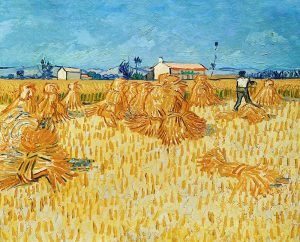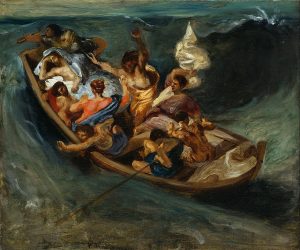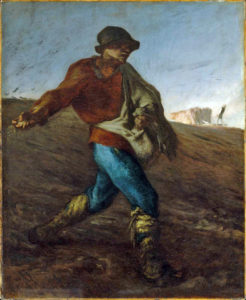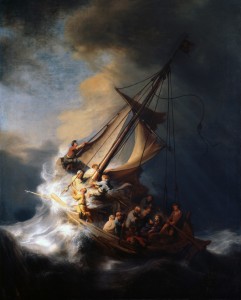Thoughts on Sunday’s Lessons for June 16, 2024 (Pentecost 4B/Proper 6)

Ernte in der Provence (Harvest in Provence, 1888), oil painting on canvas by Vincent van Gogh (1853-1890). The Israel Museum, Jerusalem. (Click image to enlarge.)
First Reading (Track One): 1 Samuel 15:34-16:13
Saul, named king of Israel amid great hopes, hasn’t worked out. In fierce and bloody verses just before this reading, God had ordered Saul to gather an army and attack the neighboring Amalekites, utterly destroying all that they have and killing all their people and livestock. But against God’s command Saul spared the king and kept the best spoils for himself. Now God regrets having made Saul king, and rejects him. In today’s reading God sends Samuel to Bethlehem to find the next king from the sons of Jesse. Much to everyone’s surprise, God passes over seven strong, handsome sons to choose the youngest: David.
First Reading (Track Two): Ezekiel 17:22-24
It is only a few days until the Summer Solstice, and all nature has turned green and lush. How fitting that many of Sunday’s readings touch on planting, growing, and new life! Much of the prophet Ezekiel’s writings are filled with angry recriminations to a people in exile, but today’s passage looks forward more gently toward a restored Israel, using the metaphor of a mighty cedar, a lofty tree that provides nesting space for birds and shade for many creatures. The prophet’s words offer an inspiring reminder that, with God’s help, a mighty tree can grow from a sprig. In the beauty of creation, we know that God is good.
Psalm (Track One): Psalm 20
Mirroring the militaristic theme of Israel’s kings and their call to holy war against their neighbors, Psalm 20 is a prayer for victory, a blessing before battle. The Psalmist calls on God to defend the people, to send help and strength, accept their offerings and advance their plans. Rather than trusting in chariots and horses, the people call on the name of God to give victory to Israel’s king.
Psalm (Track Two): Psalm 92:1-4,11-14
Echoing the Track Two first reading’s image of a mighty cedar that grows from a sprig, this Psalm of praise and thanksgiving sings of mighty trees, too. It sings about cedars of Lebanon and lofty palms, standing for those who grow and flourish under God’s nurturing care. Through righteousness, justice, and faith in God’s loving kindness, the people hope to remain ripe and fruitful all their lives.
Second Reading: 2 Corinthians 5:1-17
This week’s Lectionary metaphor of growth and fruitful harvest doesn’t jump right out at us in this passage from Paul’s second letter to the church in Corinth. But read closely, and perhaps we can catch a glimpse of it in the last few verses: When we choose to live in Christ, our lives change. Just as the leaves fall in autumn and our flowers and gardens die, only to return full of life in the spring, everything that is old passes away in Christ’s new creation. Everything becomes new for us again in the life we gain through Jesus.
Gospel: Mark 4:26-34
The two parables featured in Sunday’s Gospel draw metaphors from seeds and sowing: tiny beginnings that grow up to yield food from the earth.These are also the first two of 18 parables in Mark’s Gospel in which Jesus tells stories that hint at the nature of the Kingdom of God. “The Kingdom is like” is surely the most frequent introductory phrase in this Gospel. But wait! There’s still more! This passage also begins another recurring theme in Mark: Jesus speaks through mysterious parables in which he intentionally disguises his mission. Then he explains the real meaning to his followers but tells them to keep it all secret. Perhaps Jesus’s repeated call for a Kingdom of God – a kingdom that might be seen as a regime change from Roman rule – was too dangerous an idea to talk about in public.



